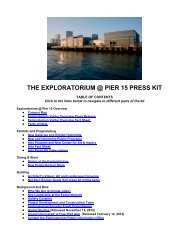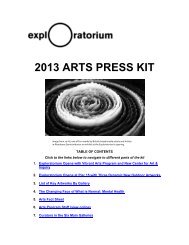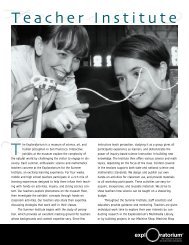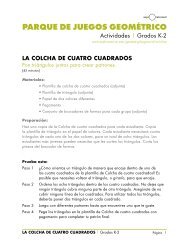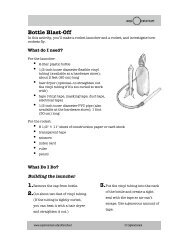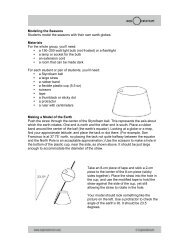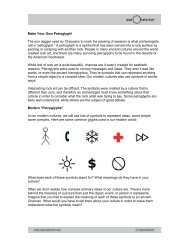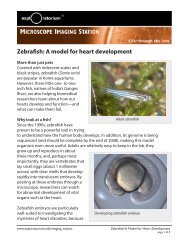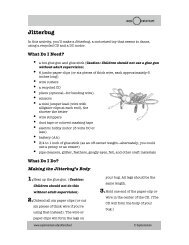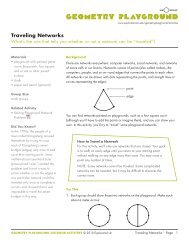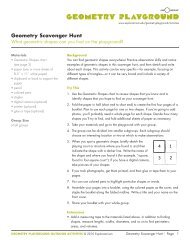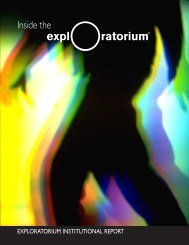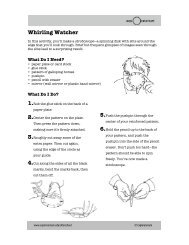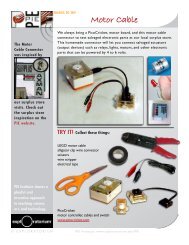Fundamentals of InquIry - Exploratorium
Fundamentals of InquIry - Exploratorium
Fundamentals of InquIry - Exploratorium
Create successful ePaper yourself
Turn your PDF publications into a flip-book with our unique Google optimized e-Paper software.
assessInG<br />
for<br />
learnInG<br />
Through activities with materials and reflective<br />
discussions, this three-day workshop provides an indepth<br />
overview <strong>of</strong> formative assessment as an integral<br />
part <strong>of</strong> science teaching. Participants experience a<br />
variety <strong>of</strong> ways <strong>of</strong> assessing students’ science process<br />
skills and conceptual development. The workshop<br />
provides ideas and tools pr<strong>of</strong>essional developers can<br />
use to help teachers apply elements <strong>of</strong> formative<br />
assessment in the classroom.<br />
You will<br />
• examine the characteristics <strong>of</strong> formative<br />
assessment and the role it plays in supporting<br />
student learning;<br />
• explore strategies for assessing student<br />
learning; and<br />
• practice and critically review formative methods<br />
<strong>of</strong> assessing students’ science skills and<br />
conceptual understanding “as you go.”<br />
date: tBd<br />
tIme: 8 a.m. to 4 p.m.<br />
Cost: $1,450<br />
($1,350 for teams <strong>of</strong> two or more)<br />
This workshop explores formative assessment as<br />
an integral part <strong>of</strong> learning. Participants experience<br />
formative assessment activities that support science<br />
teaching.<br />
the Formative assessment Cycle<br />
Participants are introduced to the formative<br />
assessment cycle, a model that can be applied to<br />
assess any science teaching goal, including science<br />
concepts, science process skills, and scientific<br />
attitudes. The steps <strong>of</strong> the formative assessment<br />
cycle include eliciting students’ current thinking<br />
related to the teaching goals and determining the<br />
next steps to help students develop their thinking.<br />
The differences between formative assessment and<br />
summative assessment will be illustrated.<br />
assessing understanding <strong>of</strong> science<br />
Concepts and Process skills<br />
Two critical aspects <strong>of</strong> teaching science are developing<br />
students’ understanding <strong>of</strong> science concepts and their<br />
use <strong>of</strong> science process skills. Participants will explore<br />
a variety <strong>of</strong> approaches for assessing both <strong>of</strong> these<br />
important teaching goals.<br />
Formative assessment Practices<br />
Activities will focus on a variety <strong>of</strong> formative<br />
assessment strategies, such as:<br />
• the role <strong>of</strong> teacher questions in eliciting students’<br />
thinking, and<br />
• methods for developing students’ abilities<br />
to benefit from self-assessment.<br />
To support the implementation <strong>of</strong> ideas from this<br />
workshop, participants have conversations about<br />
the pr<strong>of</strong>essional development design process—from<br />
the design <strong>of</strong> each individual activity to the overall<br />
structure <strong>of</strong> the workshop.<br />
www.exploratorium.edu/ifi<br />
“ Prior to this workshop<br />
I understood bits and<br />
pieces . . . but didn’t<br />
really understand<br />
how the components<br />
worked together as a<br />
whole. the Formative<br />
assessment Cycle<br />
really helped clarify<br />
what it means<br />
to do formative<br />
assessment.<br />
”<br />
—Workshop Participant



